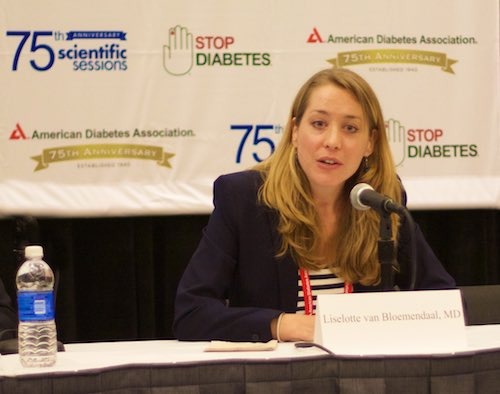More and more of us who have type 2 diabetes take one of the new drugs that mimic the action of the GLP-1 hormone so that we can manage blood sugar better. When we do, we are often pleasantly surprised to learn that taking one of these two drugs can also help us to lose a lot of weight.
Now, a study by Dutch researchers at the Diabetes Center of the VU University Medical Center in Amsterdam shows us how this positive side effect happens.
Researchers had been trying to learn how those drugs could help us get down to a normal weight, so the Dutch researchers used sophisticated techniques to see how they work. They studied one type of these GLP-1 mimetics called exenatide, which we use in the U.S. as the brands Bydureon and Byetta.
One of those researchers is Liselotte van Bloemendaal, M.D. She presented the research findings at a press conference at this year’s scientific sessions of the American Diabetes Association in Boston. Representing HealthCentral.com at this convention, I attended her press conference.

My Photo of Dr. van Bloemendaal
People with a higher body mass index, or BMI, anticipate food more than lean people do, she told us. They also find what they eat is less rewarding — not as filling — than those who weigh less. This leads to overeating, but Bydureon and Byetta counteract it by “decreasing anticipatory food reward — which may reduce craving — and increasing the feeling of food reward during consumption.”
The technique they used is called functional magnetic resonance imaging, or fMRI. With it they were able to measure brain activity by detecting associated changes in blood flow.
Eating Releases Some Hormones
“When you eat, there are several hormones released,” Dr. van Bloemendaal said. “GLP-1 is one of them. These hormones relay information to the central nervous system about the nutritional status to regulate appetite.”
Obese patients with type 2 diabetes and a second group of obese patients without type 2 diabetes were told they were going to drink chocolate milk in order to incite anticipatory response in their brains. Half of each group got a shot of exenatide, and the other half got a placebo.
Dr. van Bloemendaal and her colleagues studied 48 people in a randomized, crossover, placebo-controlled trial, the gold standard of research. They earlier published some results of their research in two papers, GLP-1 Receptor Activation Modulates Appetite- and Reward-Related Brain Areas in Humans” and “Effects of glucagon-like peptide 1 on appetite and body weight.”
The Connection Between Obesity and Diabetes
Obesity is a key risk factor for type 2 diabetes. A large percentage of us who weigh too much have it. I took Byetta between February 6, 2006, when I weighed 312 pounds, and December 5, 2007, when I weighed 168 pounds.
So I already knew that it could work for weight loss. Now we know why.
This article is based on an earlier version of my article published by HealthCentral.
Never Miss An Update
Subscribe to my free newsletter “Diabetes Update”
I send out my newsletter on first of every month. It covers new articles and columns that I have written and important developments in diabetes generally that you may have missed.


I have taken Bydureon for 2 years now and haven’t lost any weight. I eat less food than most anyone I know. I try hard! I also take Metformin and Glipizide and they don’t help me lose weight either.
Part of the problem, Mike, could be the Glipizide. It is a sulfonylurea, which is known to lead to weight gain. Of course, the best way to lose weight is to eat few carbs, which is what I switched to from Byetta in 2007.